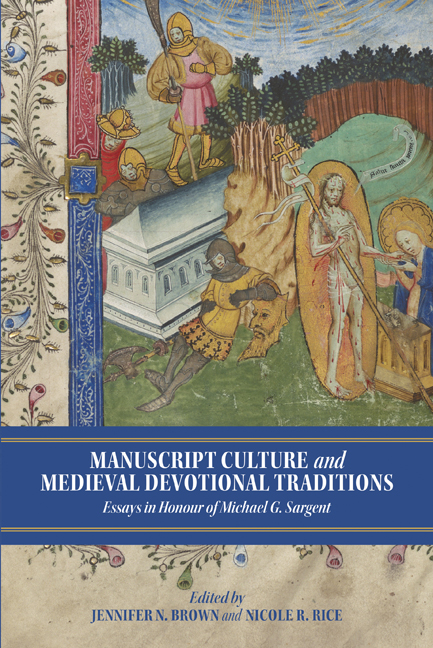Book contents
- Frontmatter
- Dedication
- Contntes
- List of Illustrations
- Acknowledgements
- List of Abbreviations
- Michael Sargent: An Appreciation
- I Manuscript Transmission and Textual Adaptation
- II Translated Texts and Devotional Implications
- III Rhetorical Strategies and Spiritual Transformations
- IV Texts and Contours of Religious Life
- Bibliography
- List of Contributors
- Michael G. Sargent’s Publications
- Index
- Tabula Gratulatoria
- York Manuscript and Early Print Studies
6 - Conservative Affectivity and the Middle English Meditationes de Passione Christi
Published online by Cambridge University Press: 24 March 2021
- Frontmatter
- Dedication
- Contntes
- List of Illustrations
- Acknowledgements
- List of Abbreviations
- Michael Sargent: An Appreciation
- I Manuscript Transmission and Textual Adaptation
- II Translated Texts and Devotional Implications
- III Rhetorical Strategies and Spiritual Transformations
- IV Texts and Contours of Religious Life
- Bibliography
- List of Contributors
- Michael G. Sargent’s Publications
- Index
- Tabula Gratulatoria
- York Manuscript and Early Print Studies
Summary
Pseudo-Bonaventuran tradition in generali
The pseudo-Bonaventuran tradition, those works in Latin and the vernacular derived from the Meditationes Vitae Christi (hereafter MVC), and its redaction that excerpts the Passion section from the Last Supper until the Harrowing of Hell, the Meditationes de Passione Christi (hereafter MPC), have provided scholarship with templates for the tone and shape of late medieval affective literature and the devotional praxes which such texts sponsored. A sense of the devotional utility of affective literature has been derived from close scholarly attention to the ecclesiastically sanctioned Mirror of the Blessed Life of Jesus Christ, an English versioning of the MVC created by the Carthusian prior of Mount Grace, Nicholas Love, and, to a lesser extent, against the variety of Middle English texts derived from the MPC (to be briefly introduced below). These works are, to varying degrees and with subtle shifts in emphasis, concerned to control their audiences’ devotional experience. Both extending and fine-tuning the cues found in their Latin sources, the English translations of pseudo-Bonaventure are studded with directives as to how the texts should be used, and also, in respect of the emotive scenes they depict, inscribed with descriptions of how the readers and hearers should feel as they experience the text, and particularly as they activate its meditations in their inner eyes – how the literature should inform religious practices that oblige their audiences to emote in spiritually fruitful ways. The extraordinary success of these and similar kinds of texts in English contexts suggests that the devotional method of meditating on the Life and, especially, the Passion of Christ was widespread, and soon after its arrival in England reached beyond an initial audience of cenobitic readers of the Latin text, and even outside of the contexts of pious aristocratic audiences (who no doubt formed a significant kernel of Nicholas Love's readership), into the pious repertoires of socially middling and mixed-lay congregational audiences. In addition to the weight of manuscript evidence, and through the proliferation of English translations of pseudo-Bonaventure presumably produced to fulfil a concomitant demand, this affective turn in English devotional life is attested within the book of Margery Kempe, someone who we know was exposed to pseudo-Bonaventure.
- Type
- Chapter
- Information
- Manuscript Culture and Medieval Devotional TraditionsEssays in Honour of Michael G. Sargent, pp. 132 - 151Publisher: Boydell & BrewerPrint publication year: 2021

